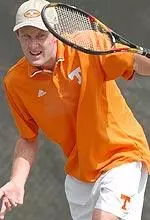University of Tennessee Athletics

2003 Tennis Season Review
June 02, 2003 | Men's Tennis
June 2, 2003
Shortly after guiding the Vols to three consecutive NCAA Final Fours in 2000, 2001 and 2002, Tennessee head coach Michael Fancutt knew the 2003 season would be a long one. The Volunteers would enter the season with a roster devoid of any seniors, having lost four of the winningest players in Tennessee history to graduation and expired eligibility following the 2002 campaign. Stepping in to fill the shoes of two departed All-America performers and two All-SEC honorees were six relatively inexperienced netters who hungered for an opportunity to prove themselves in the strongest men's tennis conference in the nation.
Prior to the season, Fancutt and associate head coach Chris Mahony enlisted the services of former Tennessee great and 1993 NCAA Singles Champion Chris Woodruff as new volunteer assistant coach, and the trio of mentors began preparing the young Vol netters for a season that would take on themes of gaining experience and achieving constant improvement.
The ambitious brigade of orange-clad netters never blinked, embarking on a mission that would be filled with struggles and sustained with highlights. The tone for the 2003 version of Rocky Top tennis was set in the fall.
During individual fall competition, Tennessee players competed in 10 different tournaments.
Both Tennessee newcomers, freshmen Vincent Perna and Rawl Martin, made quick adjustments to the elevated level of Division I college tennis. Perna stormed all the way to the "B" flight semifinal round at the adidas Invitational. Unfortunately, it was an ankle injury, not an opposing player, that ended his chances of reaching the final of his first collegiate event.
Martin rebounded from three straight losses to open his career by capturing the "B-2" flight singles title at the South Carolina Fall Invitational. With his game exhibiting a well-earned aura of confidence, Martin compiled a respectable eight singles wins by the conclusion of the fall.
Junior Wade Orr was slowed by a nagging ankle injury that hampered his performance through much of the fall. He did manage to post a 5-5 singles record and earn a spot in the "A-1" flight consolation final at the South Carolina Fall Invitational.
Mark Dietrich, a sophomore from Memphis, was the highest-ranked Vol at the conclusion of the fall, garnering a singles ranking of No. 48. Dietrich's stock rose after he reached the singles quarterfinal round at the Omni Hotels Region III Indoor Championships, where he lost to the nation's top-ranked player, Kentucky's Jesse Witten.
But the biggest story of the fall was that of junior Simon Rea. The New Zealand native earned a reputation as a giant-killer by downing three consecutive ranked opponents at the Regional Indoor Championships during an impressive charge to the semifinals. Rea posted a team-best 10-3 singles record and earned a regional fall singles ranking of No. 8.
The men from Rocky Top then set their sights on a daunting spring schedule that included 15 opponents that garnered a preseason top-75 national ranking; Tennessee was listed at No. 14 in that poll.
lt quickly became apparent that Rea's fantastic fall was far from a fluke, as the stoic gentleman won eight of his first nine spring singles contests leading up to SEC competition.
As a team, Tennessee had compiled a 6-2 record heading into the conference opener at Kentucky, with its only setbacks coming against No. 37-ranked Louisville and at No. 8-ranked Duke. In the rankings, the Vols had slipped to No. 26 in the country.
Fancutt was well-aware that the most challenging portion of the schedule was still to come, as each of the 12 SEC programs ended the 2002 season ranked in the top 50 in the Omni Hotels/ITA Collegiate Tennis Rankings and all had remained there through the first two months of the 2003 spring campaign. The Vol netters' first two SEC tests came on the road against two teams, No. 9-ranked Kentucky and No. 24-ranked Vanderbilt, that would eventually end the season with top-20 rankings. Tennessee lost both matches, and looked forward to returning home to Knoxville to host No. 15-ranked Alabama March 7.
In a solid all-around outing against the Crimson Tide, Tennessee reminded the collegiate tennis world that it was not far removed from its days as a three-time Final Four participant, and that the orange "Power T" still signified a national tennis powerhouse. The Volunteers overcame a slow start that saw them lose the always-important doubles point, and proceeded to come alive in singles competition. When all was said and done, the young Vols had toppled the highly-ranked Alabama squad by a convincing score of 4-1.
Fast forward nine days to March 16. Consecutive home losses to top-20 teams Auburn and LSU following the 'Bama upset brought Tennessee's overall record to 7-6 (1-4 SEC) and the No. 18-ranked Arkansas Razorbacks strolled onto UT's Varsity Courts smelling blood. The battle that ensued that sunny afternoon spoke volumes about the future of Big Orange tennis, as one of Tennessee's homegrown young guns emerged to vault his team to victory.
Tennessee used its first SEC doubles sweep of the season and singles wins by Orr and Rea to tie the contest at 3-3. The deciding match was a three-set slugfest at the No. 6 spot between Vol freshman Martin and Arkansas netter Hunter Benson. Despite the death of his grandmother earlier that morning, Martin somehow remained focused amidst the booming baseline exchanges. With each game that passed in the decisive third set, Martin assumed the role of attacker with increasing ferocity. Finally on match point, an errant Benson backhand landed wide, and Martin raised his fist in triumph as his teammates rushed to congratulate the hero of the day.
The Arkansas win, the Vols' second upset victory over a top-20 team, would prove to be Tennessee's final conference win of the season. Six straight losses at season's end plagued the Vol netters, as the six-man roster eventually fell victim to the unfortunate lack of depth which forced each player to compete in match after match without rest.
At the SEC Tournament in Oxford, Miss., No. 11-seeded Tennessee faced No. 6-seeded Auburn in a first-round matchup. The Vols had defeated the Tigers in the 2002 tournament final to lay claim to the title, but Auburn had exacted its revenge with a 5-2 2003 regular-season victory March 9.
Tennessee looked like a different team in the tournament. Rea recorded one of his biggest wins of the season by dispatching All-SEC first-teamer and the nation's No. 11-ranked player, Rameez Junaid, in straight sets at the No. 1 position. Putting aside a nagging back injury, sophomore Mark Henderson exorcised the demons that had haunted his singles game all season long by logging his second singles win in a row, beating Markus Schiller and thus exhibiting the improvement that Fancutt had expected and hoped for late in the season. Orr, in a courageous display of leadership and guts, overcame his own painful lower back injury to defeat hard-serving Andrew Colombo, marking his 50th career singles win as a Volunteer.
But again, depth defeated desire, and Tennessee's thin roster simply wasn't deep enough. With the match tied at 3-3, the Vols rallied behind Perna, a true freshman, who was fighting valiantly against Auburn junior Rodrigo Minozzo. Three years of SEC experience was enough to propel the Tiger upperclassman past the 20-year-old Vol in a three-set thriller. When a well-placed Minozzo drop shot eluded Perna on match point, Tennessee was eliminated in the first round of the conference tournament for the first time since the 1997 event.
The chances of the then-No. 48-ranked Vols receiving an invitation to the NCAA Tournament were unknown. Tennessee's overall record of 9-12 (2-10 SEC) was not typical of a Fancutt-led squad. The Vols had, however, navigated one of the most difficult schedules in the nation. Not since the 1992 campaign had Tennessee missed the NCAA Tournament.
On April 30, when team tournament selections were announced, the Vols' 11-year streak came to an end as Tennessee was not listed among the 64 selected teams. When the dust settled and the ball stopped bouncing, marking the end of Fancutt's sixth season at the helm of the Tennessee program, the accomplished coach knew that his goal of constant improvement had been met by each of his players.
Rea had evolved from a player who held down primarily the No. 5 singles spot in the 2002 Tennessee lineup to one of the most dominant collegians in the nation in 2003. He led the Vols in singles wins (26) and singles winning percentage (74.3 percent). His overall singles mark of 26-9 included a 9-6 record against ranked opponents. Rea's six upset victories over players ranked Nos. 69, 39, 36, 28, 15 and 11 were enough to earn him All-SEC second-team honors. He was also named the Tennessee team MVP.
Rea was the lone Vol selected to the field of 64 in the NCAA Division I Men's Singles Championships at season's end. His three-set loss to Illinois junior Brian Wilson in the first round of the tournament marked the end of Rea's breakout campaign. He ended the year ranked No. 22 in the national singles rankings.
The extremely intense Dietrich also enjoyed a stellar campaign in 2003, earning a year-end singles ranking of No. 63. While playing out of the Nos. 1 and 2 singles positions, the sophomore with the rocket-blast serve racked up 18 singles wins, good for second-best on the team. Dietrich's was consistently ranked in the national top-100 in singles, and his biggest victory of the season came at home March 30, when he defeated No. 21-ranked Catalin Gard of Ole Miss. Dietrich was the only Vol netter to garner SEC Player of the Week honors in 2003, earning that title for the period ending March 9. Also dangerous in doubles, Dietrich led the team with 17 doubles wins. His efforts throughout the year led to his selection as the eighth alternate for the NCAA Division I Men's Singles Championships.
Orr, the lone remaining member of each of Tennessee's 2000, 2001 and 2002 NCAA Final Four teams, led by example both on and off the court in 2003. In addition to his aforementioned 50th career singles win, Orr also enjoyed some other milestones during his junior campaign. He achieved career-best rankings in both singles (No. 82 on Sept. 9) and doubles (No. 30 on April 9) and tied for second on the team with 15 doubles victories. Orr also excelled in the classroom, where he majors in industrial engineering. He earned SEC Academic Honor Roll recognition and was the first-ever recipient of the Knoxville News Sentinel's Academic Excellence Award.
The bottom half of the Vol lineup, featuring Henderson, Martin, and Perna also made strides. Henderson made an appearance in the doubles rankings in Feb., listed at No. 37 with Rea. Henderson also added 15 singles wins to his career total.
Martin finished with 15 singles victories while Perna added 11.
As a team, Tennessee garnered a final national ranking of No. 55.
The difficult season in Big Orange Country has proven to be nothing to fret about. In fact, Fancutt, Mahony and Woodruff are already smiling about the Vols' outlook in 2004. Tennessee had no seniors to lose in 2003, and will benefit from the addition of Southern Cal transfer Damien Spizzo, who sat out the 2003 season. The Vols will also add a few promising prospects to the ranks, signaling a possible return to dominance for the mighty Volunteers.













